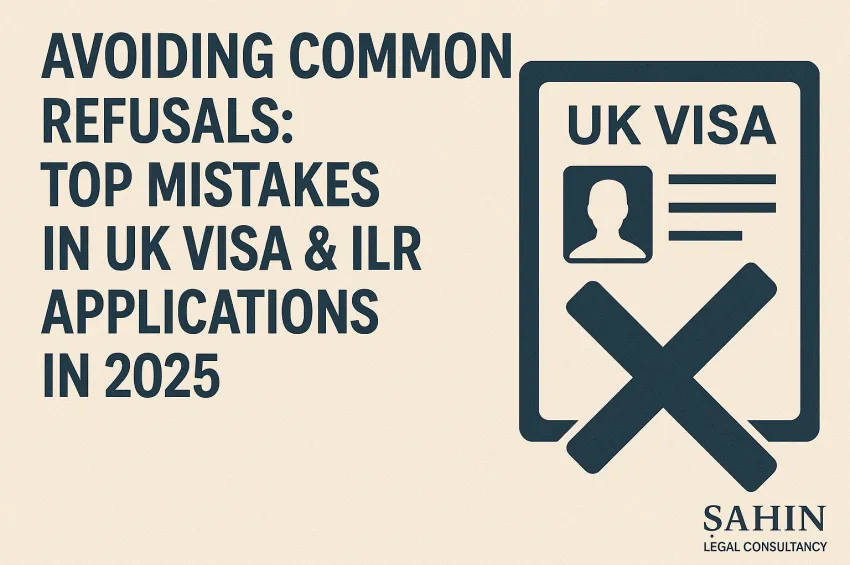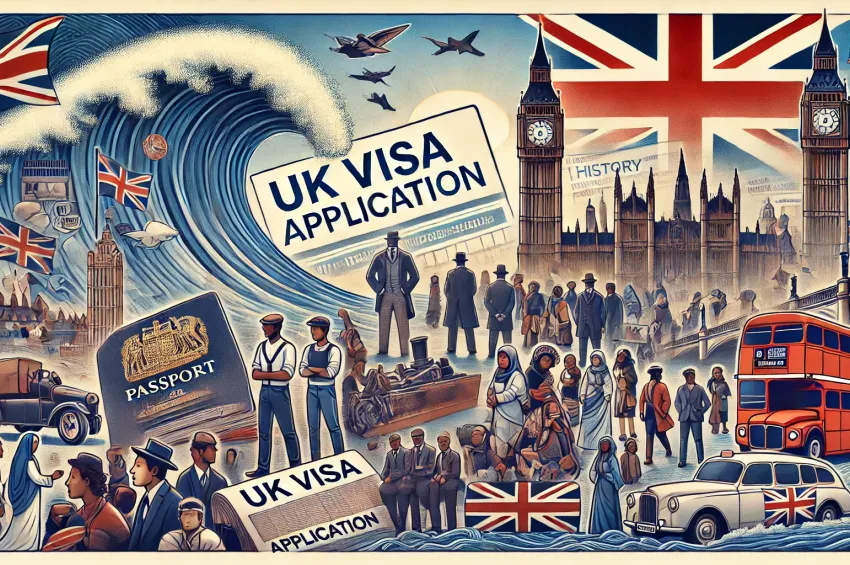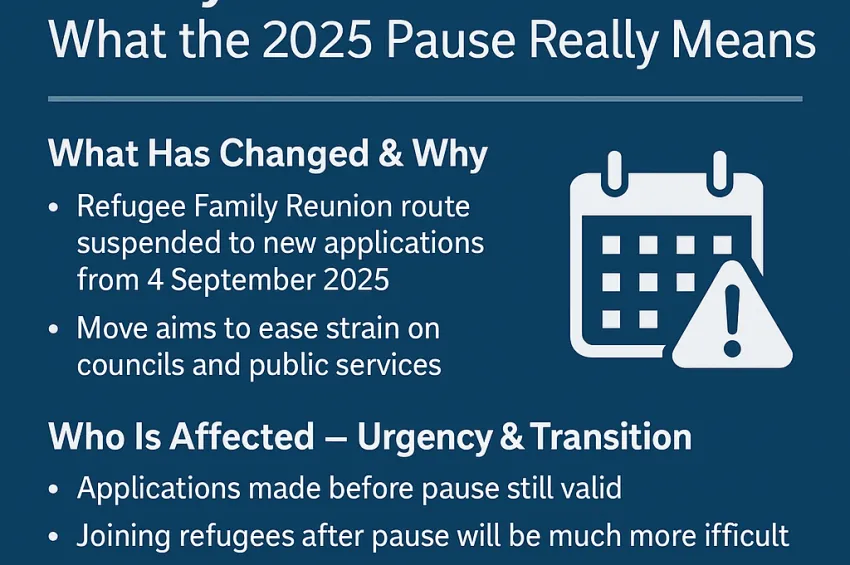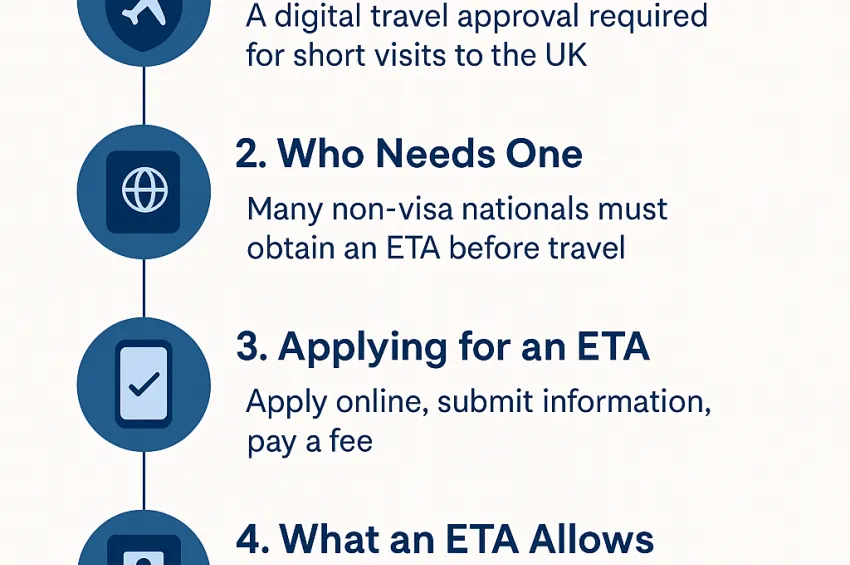
Introduction: Every year, many UK visa and Indefinite Leave to Remain (ILR) applications are refused due to errors that could have been prevented. According to Home Office statistics, roughly 5% of ILR applications get refused, often for reasons like gaps in residency or documentation issues . For visas in general, rejection rates remain high in 2025 – especially for applicants from certain countries or those providing weak evidence.
A refusal not only causes loss of hefty fees but can disrupt lives and future plans. The good news is that most common refusal reasons are avoidable with careful preparation . In this article, we highlight the top mistakes in UK visa and ILR applications in 2025 and provide tips on how to avoid them, so you can maximize your chances of a successful outcome.
1. Incomplete or Inaccurate Application Forms
One of the most frequent reasons for refusal is submitting an incomplete or incorrect application. The UK’s online forms are long and detailed. Even minor errors or omissions can raise red flags and lead to rejection . Missing sections, inconsistent answers (e.g. employment dates that don’t match attached documents), or failing to sign/date declarations can all result in a refusal on formal grounds.
-
How to avoid: Take time to double-check every section of the form . Ensure you answer all mandatory questions and your answers are accurate and truthful. Cross-reference with your supporting documents – for example, the travel history you list should match entry/exit stamps in your passport. If English isn’t your strong suit, consider getting help to avoid misunderstandings. It can also help to print a checklist of required info (dates of previous travel, addresses, etc.) beforehand. Never guess an answer; if uncertain, seek clarification or legal advice. A well-prepared form shows the caseworker that you are organized and credible, whereas a sloppy form sows doubt about your reliability .
2. Insufficient Supporting Documents
Failure to provide all required documents – or providing documents that are inadequate – is a top cause of refusals. UKVI caseworkers rely on documentary evidence to verify every claim in your application. Missing documents, wrong formats, or untranslated papers can all doom an application .
Common pitfalls include not submitting bank statements or pay slips for the full period required, leaving out required letters (like an employer letter or accommodation details), or not providing divorce certificates or birth certificates when needed to prove relationships. For ILR, many applications are refused because of issues with proof of residency (e.g. not enough documents covering the full qualifying period) .
-
How to avoid: Read the official guidance specific to your visa category (or ILR route) and make a document checklist. For example, a spouse visa under Appendix FM will require evidence of income (6 months of payslips and bank statements) and an employer letter, proof of English, TB certificate (if applicable), etc. Assemble complete financial evidence (salary slips, bank statements covering the same period, tax documents if self-employed) . If a document is missing for a genuine reason, explain it in a cover letter and provide an alternative if possible. Always submit official translations for any document not in English . Also ensure scans/copies are clear and legible. It can be helpful to label or index your documents for the caseworker’s ease. Essentially, you want to leave no doubt that you meet each requirement by providing robust evidence for it .
3. Financial Requirements Not Met or Proven
Financial issues are a frequent ground for refusal across many visa types. The Home Office must be convinced you have sufficient funds and, where applicable, the specific level of income required. Failure to meet the financial requirement (or to document it properly) is routinely cited in refusal letters . This could mean not having enough income, not holding required savings for the requisite time, or simply not evidencing your finances clearly.
For instance, spouse visa applications are often refused for not demonstrating the minimum income threshold (now £29,000) through acceptable documents. Visitor visas get refused if the applicant doesn’t show adequate funds for the trip or if financial documents look irregular (e.g. unexplained large deposits). ILR applications can be refused for financial reasons too (for example, Tier 1 General ILR applications infamously faced refusals due to tax discrepancies, where an applicant’s declared earnings to UKVI didn’t match HMRC records – seen as deception) .
-
How to avoid: Know the financial requirement for your application and plan ahead. If a fixed amount of income is needed (as in family or work visas), ensure you meet or exceed it before applying. Provide the specific documents the rules ask for – e.g. six months of continuous bank statements and payslips for employed earnings . Do not assume the Home Office will “figure it out” from partial evidence; they won’t. If there are anomalies (like a one-time large bank deposit or a period of unpaid leave affecting income), address them upfront with an explanation and extra evidence (such as a letter explaining the source of a deposit) . Consistency is key: the income shown on your payslips must exactly match what appears in your bank statements . For self-employed or business income, include comprehensive financial statements and an accountant letter as specified in guidance. Lastly, if combining sources (salary + savings, etc.), double-check the formulas in the rules to prove the total meets the requirement. With careful presentation of finances, you can avoid the easily-made mistakes that lead to refusals on financial grounds.
4. Lack of Evidence of Genuine Intentions or Relationships
Immigration applications often require convincing the Home Office of your true intentions or the genuineness of claimed relationships. Many refusals stem from a perceived lack of credibility in this area . For example, visitor visas are refused if the officer doubts you will return home (i.e. suspects you actually intend to overstay). Spouse visas can be refused if the marriage looks like a marriage of convenience (not enough evidence of a genuine partnership). Even work visas might be refused if the job offer appears not genuine.
For family visas, an “Inadequate proof of relationship” is a common refusal reason – e.g. not providing correspondence, photographs, or cohabitation proof to show a real marriage. For visitor visas, a “lack of evidence of genuine travel plans or ties to home country” leads to refusals; the caseworker isn’t convinced the visit is short-term. In ILR 10-year long residence cases, the Home Office may scrutinize whether the UK has genuinely been your home (continuous residence) or if you’ve just been using visas to maintain status without real integration.
-
How to avoid: Anticipate the caseworker’s doubts and counter them with evidence. If applying for a Spouse visa, include ample proof of your relationship: marriage certificate, but also wedding photos, chat logs, joint bills, etc. A personal statement describing your relationship history can help give context. If applying for a visitor visa, provide a detailed itinerary, invitation letter from your UK host explaining the purpose and duration of the visit , and strong evidence of ties to your home country (employment, family, property that show you have reasons to return) . Essentially, paint a full picture of honesty: why you’re coming to the UK and that you will abide by the visa conditions. For any visa interview (such as Tier 4 student interviews or spouse visa interviews), prepare to answer questions consistently with your documents. Remember, the onus is on the applicant to prove their intentions are genuine – if you don’t, a refusal on credibility grounds can result.
5. Choosing the Wrong Category or Breaking Visa Rules
Sometimes refusals happen simply because the applicant applied under the wrong category or violated procedural rules. For instance, someone might apply for a “Family visa” when they should have applied as a PBS dependent, or apply for ILR under the wrong route (e.g. trying to use 5-year work route rules when only eligible under 10-year long residence). Incorrect visa category selection is listed among top mistakes by immigration lawyers . Additionally, switching rules are strict – if you apply in-country when not allowed, it’s a ground for refusal. Common mistakes include a visitor in the UK attempting to switch to a Work visa (not permitted), or applying for ILR too early (before completing the required period).
Another frequent issue is breaching conditions or overstaying, which can torpedo an application. If you have a period of unauthorized stay, even a short overstay, your application may be refused unless you fit an exception. The Home Office refuses many ILR long residence applications due to gaps in lawful residence or previous immigration violations . Overstaying by more than the allowed grace period (14 days under current rules, with good reason) will break your continuous residence and usually reset the clock for ILR.
-
How to avoid: Ensure you’re eligible for the visa you’re applying for. Read the criteria carefully. If you’re switching or extending, verify that the rules allow it in your circumstances. If in doubt between categories, get advice – applying under the wrong category is wasting time and money. Always apply before your current visa expires; even a one-day overstay without good reason can be catastrophic. If you do overstay or have a past breach, disclose it and see if an exception in Paragraph 39E applies (a discretionary overlook for short overstays under certain conditions) – don’t try to hide it, as the Home Office will know. For ILR long residence, be mindful of the exact lawful residence counts: if you left the UK and re-entered with a new visa, did you apply within the allowed timeframe? If not, that break can lead to refusal. By playing by the rules – applying on time, in the correct category, and truthfully – you eliminate some very basic but serious reasons for refusal.
6. Inadequate Accommodation or Maintenance (Family Visas)
For family visas (and some others), showing adequate accommodation and maintenance is a requirement. While not as commonly a sole reason for refusal as other factors, it still features among refusal reasons when overlooked . For example, if you are bringing a spouse and children but living in a one-bedroom flat, the Home Office may find the accommodation inadequate (potentially breaching overcrowding standards). Or if a sponsor promises accommodation for an applicant, failure to provide evidence (like a property inspection report or letter from a landlord) could be an issue. Additionally, if you’re exempt from the income requirement due to disability benefits, you must prove “adequate maintenance” – applications can be refused if the caseworker isn’t satisfied you have enough income after expenses like housing costs .
-
How to avoid: Submit evidence of your housing: a tenancy agreement or title deed and a letter from the landlord (if renting) allowing your family member to reside. If there are many people in the household, include a report or calculation to show it won’t be overcrowded under UK housing standards. For maintenance, provide a detailed budget of your income versus expenses to show your family can live without extra public funds. Include payslips/benefit letters and bills to back this up. While accommodation might not be the first thing on an applicant’s mind, it is part of the holistic assessment – demonstrating you have a stable, adequate home strengthens your case and prevents an avoidable refusal on these grounds.
7. Missing or Untranslated Documents
Submitting documents in a form that the Home Office cannot use is as bad as not submitting them at all. If you omit required originals or certified copies, or you provide documents in a foreign language without an official translation, the evidence may be disregarded, leading to refusal . This mistake often happens with birth certificates, marriage certificates, bank statements, or police certificates from abroad – applicants forget translation or assume a caseworker understands (they won’t act on a non-English document unless translated).
Also, unclear photocopies or scans can be problematic now that most applications are digital – if the upload is unreadable, it’s as if not provided. Some applicants also mistakenly upload only partial documents (e.g. only the first page of a bank statement). UKVI expects the full set in the correct format.
-
How to avoid: Follow document format instructions in the application guide. Always get translations for any document not in English (or Welsh). The translator’s certificate must include their credentials and confirmation the translation is accurate. Double-check that every required document is included, in full. It can help to paginate statements and highlight key info (like highlight salary entries in bank statements). If you have multiple files, label them clearly (“Passport bio page – Applicant”; “MarriageCert with translation” etc.). By treating your document pack with care and thoroughness, you signal you’ve left no gaps – preventing an officer from refusing due to a missing or unusable document.
8. Failing the English Language or Life in the UK Requirements
For many visa types and certainly for ILR, applicants must meet an English language requirement (and for ILR, also pass the Life in the UK test). A common mistake is neglecting these tests or taking the wrong test. For instance, spouse visa applicants sometimes overlook booking an English A1 test in time, or ILR applicants assume a past test counts when it doesn’t. ILR applications are often refused because the applicant did not take the Life in the UK test or failed to provide the pass certificate – which is an automatic refusal for settlement.
Another scenario: taking an English test not approved by UKVI or at the wrong level. There have been cases of applicants spending money on an IELTS Academic test, which isn’t needed for ILR (a simpler IELTS for UKVI or GESE test at B1 would suffice). If the test is not on the approved list or the certificate is expired/withdrawn, it won’t count .
-
How to avoid: Determine exactly which test you need. For entry clearance or initial visas, often A1 level is required; for extensions A2; for ILR B1. Check the approved test provider list on gov.uk and book well in advance. Keep the test certificate safe and submit a copy with your application. If you have a degree taught in English, obtain the Ecctis (formerly UK NARIC) confirmation letter in lieu of a test . And do not forget the Life in the UK test for settlement – book it early, study the handbook, and pass it, providing the unique reference number in your ILR form. This “Knowledge of Language and Life” (KoLL) requirement is mandatory for most adult ILR applicants; a surprising number of refusals occur simply because the applicant didn’t realize they needed to pass a fairly challenging quiz about British history and culture. In short, plan for the required tests as an integral part of your application timeline.
9. Excessive Absences or Gaps in Continuous Residence (ILR Long Residence)
If you are applying for ILR – especially under the 10-year long residence route or a work visa route – maintaining continuous lawful residence is critical. A top ILR refusal reason is excessive absences from the UK during the qualifying period . Long residence ILR applicants must not have spent too long outside the UK; historically more than 540 days total or a single absence over 6 months could trigger refusal. Under current rules aligned in Appendix Continuous Residence, absences should not exceed 180 days in any 12-month period (with some exceptions) . Failing to disclose or account for absences is dangerous – the Home Office does check travel history via stamps and border records.
Similarly, any gap in lawful leave (periods without a valid visa) can break continuous residence. A common pitfall: someone’s visa expired and they applied late – even if granted later, that gap might disqualify ILR unless an exception applies. Another example is leaving the UK after a visa expiry and coming back on a new visa later; unless it was within a very short window, that break resets the clock.
-
How to avoid: When applying for ILR, prepare a comprehensive record of your UK absences. List every trip abroad with dates and durations, and ensure none exceed the allowance. If you had an absence beyond the limit for an exceptional reason (e.g. caring for a dying parent overseas), gather evidence of that circumstance – the rules do allow discretion for compelling reasons like serious illness or conflict . If you aren’t sure of exact dates, obtain a Subject Access Request for your travel history. For lawful status gaps: ideally, avoid them altogether by extending or switching visas in time. If you did have a short out-of-time application, see if you fell under the 14-day grace (Paragraph 39E) – if so, mention it; the Home Office can overlook that gap. If you left the UK and re-entered on a new visa, be aware that if you had valid leave when you departed and returned with a new valid visa without long delay, that might be allowable (recent rule changes in 2025 have actually clarified that for Long Residence ILR, leaving with valid permission and coming back on another visa won’t break continuity as long as the absence limits are respected ). Provide evidence that you kept your ties to the UK during any such absence. By proactively addressing absences and continuity, you can avoid the nasty surprise of an ILR refusal for failing the continuous residence requirement.
10. Character Issues: Undeclared Convictions or Tax/Debt Problems
The general grounds for refusal include character and conduct issues – and many applicants trip up here by not disclosing information or by having issues like unpaid taxes. For ILR especially, the Home Office applies a “good character” test similar to citizenship. Common reasons ILR gets refused include undeclared criminal convictions, or fairly recent convictions that make you ineligible. Even relatively minor offenses (e.g. a recent drink-driving conviction) can lead to refusal until some time has passed . Driving offenses must be declared; a single speeding ticket fine might not jeopardize ILR, but failing to mention it would be a false representation, which is serious.
Another modern refusal ground is outstanding NHS debt or litigation debt to the Home Office, which can lead to refusal under Part 9 of the Rules. And as noted, tax discrepancies have caused many refusals: if you’re a visa holder who previously had to meet income thresholds (like a Tier 1 Entrepreneur or Skilled Worker), and the income you claimed to UKVI doesn’t match what you filed with HMRC for taxes, the Home Office may allege deception . In one example, Tier 1 General ILR applicants were routinely refused and even banned for 10 years for underreporting income to HMRC after having shown higher income to get their visa – considered deliberate misrepresentation.
-
How to avoid: Be honest and upfront about any criminal history. Read the application form declarations carefully and disclose everything asked, even if you think it’s minor or expunged. The Home Office’s view is if in doubt, declare it. For ILR, check the “sentence threshold”: e.g., a single non-custodial offense (like a fine) may not bar ILR once 24 months have passed since conviction, but multiple offenses or recent serious ones will . So time your application wisely if you have a conviction – you might need to wait until it’s spent or the exclusion period is over.
For financial good character: ensure you have paid all your taxes correctly and on time. If you are self-employed or have run a business, review your HMRC submissions. It’s wise to include a tax clearance letter or SA302s in ILR applications from such routes to show transparency. Pay off any NHS debts or overstay charges. If you’ve had a bankruptcy or IVAs, disclose them if asked. Debt in itself isn’t always a refusal ground, but “unresolved” debts or patterns of non-compliance could be – for example, unpaid court judgments (CCJs) that you failed to mention might cast doubt on your good character . The Ash Norton Solicitors guide notes that while debt isn’t a direct ground, unpaid CCJs or not disclosing financial issues can negatively affect an ILR application . By resolving any outstanding issues and being fully candid in your application, you protect yourself from a character-based refusal.
Conclusion
Preparing a successful UK visa or ILR application in 2025 requires diligence and attention to detail. The top mistakes leading to refusals – from paperwork errors to unmet requirements – are all avoidable with the right approach. Start early, use official checklists, and consider professional advice for complex cases. Learn from common pitfalls: ensure forms are complete and accurate, provide robust documentation (financial, relationship, etc.), and double-check that you meet all specific criteria for your visa category. As statistics show, a small fraction of applications are refused and often for exactly the reasons discussed above . By avoiding these mistakes, you greatly increase your chances of joining the majority who are approved.
If you do get refused, remember you may have options like an administrative review or appeal (depending on the type of application), but it’s far better to “get it right the first time.” UK immigration rules are unforgiving of errors, but with careful planning, you can navigate the system successfully. In short: be thorough, truthful, and organized – and your application will stand the best chance of a positive decision.















